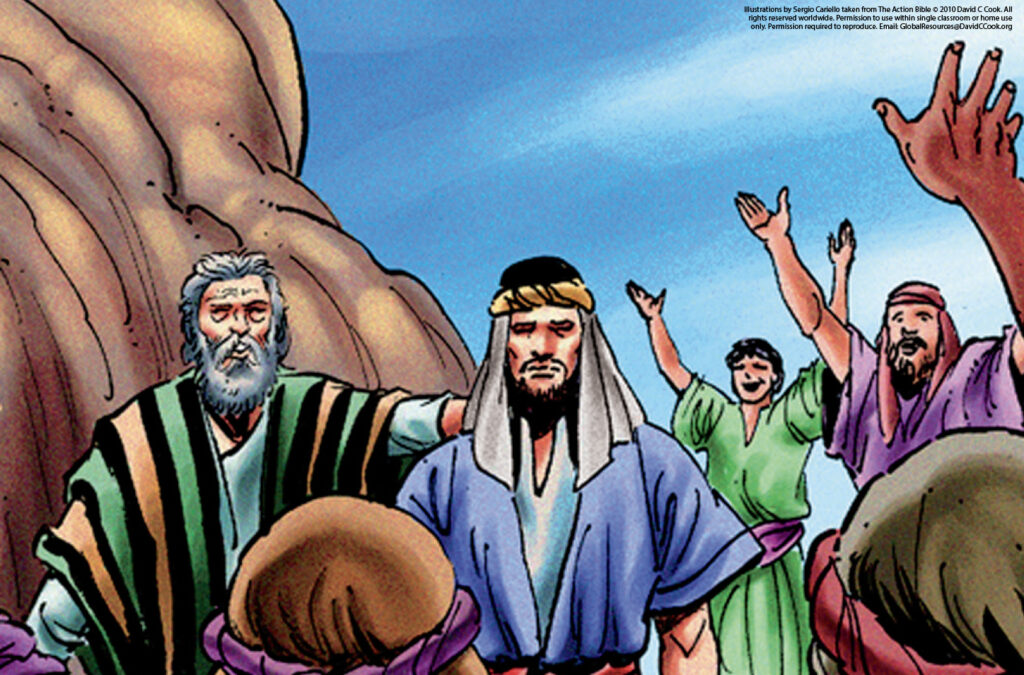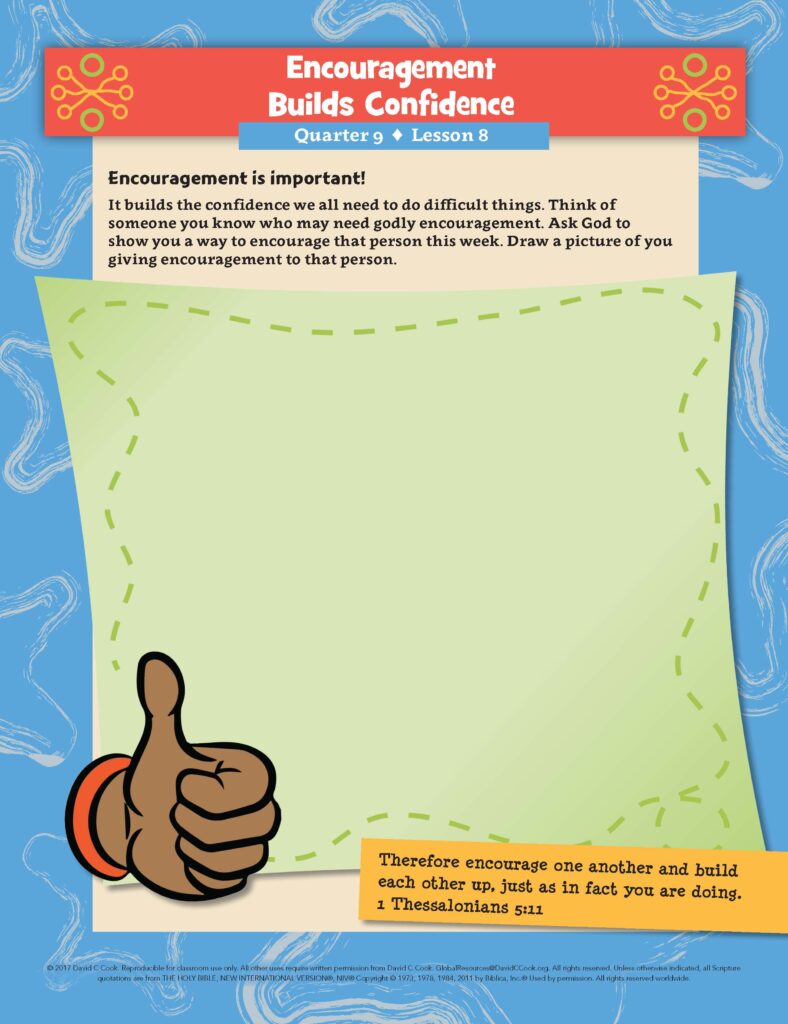During the lesson, the information for you to know is written in regular type, and what we suggest speaking or reading aloud to children is in bold. All resources for this lesson, including the Teacher Guide, Student Page, Family Connection Card, and other resources can be downloaded in a ZIP file by clicking on the following link:
In some lessons you will find "resource articles." These are articles written by experts from around the world to help equip you for your work with children and adolescents. Share them with parents or guardians if you consider it appropriate.
Therefore encourage one another and build each other up, just as in fact you are doing.
1 Thessalonians 5:11
Christians in the early church faced severe persecution. Like many Christians today, they lived in danger of being beaten, imprisoned, or killed for their belief in Jesus. (You may face similar dangers.) When Paul told the early Christians to encourage one another, it was not simply so they could feel good about themselves. Paul was talking about deep encouragement that builds someone’s confidence in God and in himself.
Who has encouraged you in this way at some time in your life? How did the encouragement build your confidence? Put Paul’s words from 1 Thessalonians 5:11 into action this week. Pray for the Lord to show you how to encourage your students and their families. Then encourage them in the ways God shows you.
Let children’s families know that this is the final week in the confidence unit. Children will learn that encouragement builds confidence. Suggest that families take turns encouraging family members.
Teacher Tip: If possible, email or text the Family Connection Card to the families of your students.
Greet children warmly by name as they arrive. Tell them something nice about themselves.
Sit in a circle with your children. Tell them that they will encourage each other. Hold the small rock in your hands and encourage the child on your right. You will do this by saying, “(Name of child), you are really good at ________________, and I think God will use you to _____________.” Then give the rock to that child. He will turn to the child on his right and repeat the words, saying something that child is good at. Continue going around in the circle until the child on your left tells you something you are good at.
How did you feel when your neighbour told you what you are good at?
Allow 2–3 children to respond.
How did you feel when your neighbour told you how she thinks God may use you in the future?
Ask 2–3 different children to respond.
We encourage others when we give them hope or support. Encouraging others helps build their confidence. We can encourage people with our words and our actions. But there is another kind of encouragement that is even more powerful than hearing nice things about oneself. This is godly encouragement. Godly encouragement helps build someone’s confidence because it speaks God’s truth to the other person. Today you will hear a Bible story about how one man gave godly encouragement to another.
The children can remain in the circle for the Bible story.
Who remembers Moses? God chose Moses to lead His people, the Israelites, out of slavery in Egypt.
What else do you remember about Moses?
Allow children to share what they know.
Today’s story takes place near the end of Moses’ life when he was a very old man. He had led the Israelites in the wilderness for 40 years. God was now going to lead His people into the Promised Land. But He would not use Moses to lead them. God chose a strong, younger man named Joshua to lead Israel after Moses died.
Many of Israel’s enemies lived in the Promised Land. These enemies were strong and had mighty armies. The Israelites would have to defeat them in battle. God wanted to prepare Joshua to lead the Israelites into the Promised Land. He told Moses to encourage and strengthen Joshua for this long and difficult task.
Moses obeyed God. And when he was 120 years old, Moses encouraged Joshua in front of all the Israelites.
Optional: If possible, share the image from The Action Bible.

Explain to the children that you will read 4 statements. They will guess which statement Moses actually said to Joshua.
Call on several children to share their guesses. Then reveal that statement 3 is the correct answer and read it to the children again.
Why do you think Moses told Joshua to be strong and courageous?
Help your children understand that Joshua needed to be strong and courageous so he could lead the Israelites in battle.
Why do you think that Moses told Joshua that the Lord would go before him and be with him always?
Help your children understand that Joshua would need to remember that he was not alone in this task. But Joshua would also need to remember that he could only do the task with God’s help.
Why do you think that Moses told Joshua not to be afraid or discouraged?
Help your children understand that there would be times when Joshua would be afraid and discouraged by his circumstances but that the Lord’s presence would be his strength.
Imagine if Moses had encouraged Joshua with the other statements instead. Those would have been nice words to say. They may have helped Joshua feel good about how he looked or how strong he was. However, the type of encouragement God told Moses to give Joshua was deeper.
Encouragement helps people to feel good about themselves. It can even make people more confident. But godly encouragement does even more. Godly encouragement helps people understand who God made them to be. It reminds them that they are created and loved by God and that He will be with them always. When people understand that they are special to God and that He will help them to do what He has called them to do, it builds their confidence to do difficult things.
God knew Joshua would face some very difficult challenges. God knew Joshua would need a lot of confidence to do what He had called him to do. So God used Moses to encourage Joshua with godly encouragement.
After Moses died, God encouraged Joshua again using the same words Moses had said:
If you are using the Memory Verse Poster, show it to the students.
Have I not commanded you? Be strong and courageous. Do not be afraid; do not be discouraged, for the Lord your God will be with you wherever you go.
Joshua 1:9

God knew that Joshua would need encouragement when he faced the enemies. In fact, this encouragement was so important that God said these words to Joshua 3 times! Godly encouragement, like the encouragement Moses and God gave to Joshua, can affect how we feel about ourselves and how we act. It is like the game we did at the beginning of class—godly encouragement strengthens us. When we begin to see ourselves the way God does, it builds our confidence to do difficult things. When we know that God has confidence in us, we can be confident in who He created us to be.
God promised to be with Joshua and His people. God is with you and wants to give you confidence. You can ask Him and He will do this. He loves you very much!
Not only does God want to encourage us, but He also wants us to encourage others too. Being able to give good encouragement is actually a gift from God! Listen to this verse:
Therefore encourage one another and build each other up, just as in fact you are doing.
1 Thessalonians 5:11
Think of something difficult you are facing or need to do. Maybe you are struggling in school. Or maybe someone has hurt you deeply.
What would encourage you and give you confidence in that situation? Ask God for that encouragement.
Give the children a few moments to think of situations where they need encouragement.
Now think of someone you know who may need godly encouragement. It may be a friend or a family member. Ask God to show you a way to encourage that person this week.
Pause for a moment for the children to think and pray.
If you have thought of a way to encourage the other person, stand up now. If you do not have an idea yet but want to encourage that person this week, stand up now.
Optional: If you are using the Student Pages, there is space for the children to draw themselves encouraging someone.

Close class by speaking the following blessing based on 1 Thessalonians 5:11.
Blessing: May God strengthen and encourage you. May you continue to give godly encouragement to one another. May God use the godly encouragement you receive to grow your confidence.
Lead the children in singing this quarter’s song, if possible. (soft return here)
Life on Life ©2020 David C Cook. Reproducible for home or classroom use only. All other uses require written permission from David C Cook [email protected]. All rights reserved.